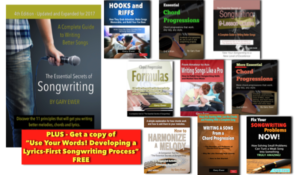The best editing in the creative arts makes things shorter, not longer. That’s not a rule, and it’s not exclusively true, but it’s almost always the case.
Pop songs tend to be 3-4 minutes in length. That’s usually because of the subject matter. People think it’s because we don’t have attention spans that will allow for longer songs, but that’s not the reason. We happily watch 2-hour long movies, but get fidgety with a song that’s longer than 5 minutes.
 Does chord theory give you a headache? Need to start at the beginning? “The Essential Secrets of Songwriting” 10-eBook Bundle includes several eBooks meant to show you exactly how chords work. It also includes hundreds of progressions you can use right now in your songs, and formulas for creating your own in seconds. Get today’s free deal: a copy of “Use Your Words! Developing a Lyrics-First Songwriting Process”
Does chord theory give you a headache? Need to start at the beginning? “The Essential Secrets of Songwriting” 10-eBook Bundle includes several eBooks meant to show you exactly how chords work. It also includes hundreds of progressions you can use right now in your songs, and formulas for creating your own in seconds. Get today’s free deal: a copy of “Use Your Words! Developing a Lyrics-First Songwriting Process”
Most songs in any of the pop genres don’t try to develop complex plot lines, philosophies or intricate ideas, mainly because immediacy is a feature of pop music; audiences want to be able to perceive the general gist of your song in one manageable bite.
They don’t mind if they eventually discover other things hidden within the song: double meanings, or perhaps connections between various melodies not apparent at first. But they’ll usually only go searching for such things if they’re immediately drawn to the song.
So short songs (3-4 minutes) is not a thing because songwriters are solving a problem of audiences with short attention spans, any more than finger food was ever meant to be a meal. Shortness, at least in songwriting, is a feature, not a solution.
If, as you finish recording your latest song, you find yourself asking, “I wonder if this is too long?”, the answer is almost always yes. Editing a 5-minute song to being 4-and-a-half minutes almost always makes a better product.
So:
- 4-bar intros almost always work better than 8-bar intros.
- Try a song with no intro.
- Get to the chorus before the 1-minute mark.
- Shorten the instrumental prep between the chorus and verse 2, or maybe eliminate it entirely.
- Avoid long, rambling solos or bridge sections.
 Written by Gary Ewer. Follow on Twitter.
Written by Gary Ewer. Follow on Twitter.
“Essential Chord Progressions” give you hundreds of progressions you can use as is, or modify to suit the songs you’re working on. If all you need are some chords to get you going, check out this ebook collection.
give you hundreds of progressions you can use as is, or modify to suit the songs you’re working on. If all you need are some chords to get you going, check out this ebook collection.










